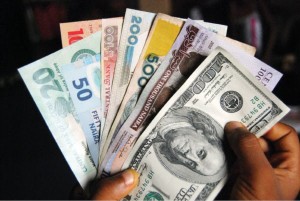Naira Weakens on Dollar Demand After Inflation Slows
The naira declined after the country’s inflation slowed to a nine-month low and on speculation importers demanded more dollars for transactions.
The currency of Africa’s largest oil producer slipped 0.2 percent to 157.525 per dollar as of 1:48 p.m. in Lagos, the commercial capital. The naira has increased 3 percent this year, after reaching a record low of 165.25 in December, according to data compiled by Bloomberg.
Nigeria relies on imports to meet 70 percent of its fuel needs because of inadequate refining capacity, according to the Petroleum Ministry. The inflation rate fell to 11.3 percent in September, from 11.7 percent in August, the Abuja-based statistics agency said. The Central Bank of Nigeria, led by Governor Lamido Sanusi, has left its benchmark interest rate unchanged at a record 12 percent this year to help support the naira. The bank’s goal is to bring the inflation rate down to less than 10 percent.
“Despite the fall in core inflation, which is mostly the result of base effects, we view that the CBN will keep monetary policy tight over the near-term, with interest rates firmly on hold for the remainder of the year,” Thalma Corbett, chief economist at Paarl, South Africa-based NKC Independent Economists, wrote in an e-mailed note today. “Cutting rates too soon could undermine the stability of the naira and hence fuel inflationary pressures again.”
Yields on Nigeria’s 16.39 percent debt maturing January 2022 rose five basis points to 13.67 percent, according to yesterday’s data on the Financial Markets Dealers Association website. The yield on the nation’s $500 million of Eurobonds due January 2021 were little changed at 4.675 percent today.
Source: Bloomberg









